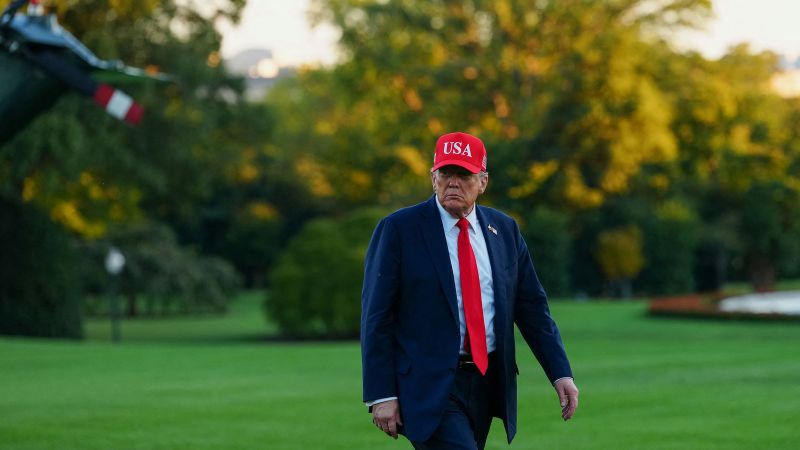Analysis: The White House claims a left-wing judicial ‘insurrection.’ But many GOP and Trump nominees are rebuking the president, too
Around 2 p.m. Saturday, top White House adviser Stephen Miller took to X to warn of a “growing movement of leftwing terrorism” that is “shielded by far-left Democrat judges.”
Mere hours later, President Donald Trump’s attempts to use the military on US soil to combat this supposed threat suffered their biggest blow to date.
But it didn’t come from a “Democrat judge”; it came from someone Trump himself had nominated in 2018, US District Judge Karin Immergut.
By the end of the weekend, Immergut had ruled against Trump twice. She did so both for the administration’s initial attempted National Guard deployment to Portland, Oregon, and then again after suggesting it had defied her initial order by attempting to send in California troops. She even floated the idea that Trump was effectively trying to illegally implement “martial law.”
It was a dizzying series of events. But it was an instructive one.
Despite the administration’s claims of what Miller has labeled a left-wing “legal insurrection,” the list of judges ruling against the president includes a fast-growing number of Republican- and even Trump-appointed ones.
To date, GOP-appointed judges have ruled against the administration in more than a dozen high-profile cases. And their ranks include at least eight Trump-appointed judges.
They’ve also often used strong language that suggested Trump and his administration were blatantly violating the law.
The rhetoric around these cases is getting increasingly ugly, with some Trump allies taking Miller’s cue and calling for impeaching judges or disregarding their rulings. Elon Musk has even called efforts to thwart Trump’s actions “treason.”
But the legal paper trail suggests something else entirely: that Trump is simply trying to do lots of illegal things — so much so that it forces even GOP- and Trump-appointed judges to call that out.
Let’s recap the big ones so far.
Deploying the National Guard to Portland
The case: Trump has sought to use the troops to protect an Immigration and Customs Enforcement facility that has faced protests, which the administration has cast as violent.
Judge: US District Judge Karin Immergut
Nominated by: Trump (2019)
In the judge’s words: “This historical tradition boils down to a simple proposition: this is a nation of Constitutional law, not martial law. Defendants have made a range of arguments that, if accepted, risk blurring the line between civil and military federal power — to the detriment of this nation.” Read the filing here.
The administration’s action “does appear to be in direct contradiction of my order,” she said.
Lawsuit targeting Maryland judges who ruled against the administration
The case: Trump sued the entire federal court bench in Maryland over judges’ orders putting a two-day pause on deportations.
Judge: US District Court Judge Thomas Cullen
Nominated by: Trump (2020)
In the judge’s words: “This concerted effort by the Executive to smear and impugn individual judges who rule against it is both unprecedented and unfortunate.” Read the filing here.
Deporting migrants without due process and using the Alien Enemies Act
The cases: A series of cases has dealt with the administration’s attempts to rapidly deport migrants without due process, often by using a centuries-old law called the Alien Enemies Act , which had previously been reserved for wartime. In some instances, this has led to migrants being deported to places they weren’t supposed to be sent, like the case of Kilmar Abrego Garcia.
Judge: US appellate Judge J. Harvie Wilkinson III (leading a three-judge panel)
Nominated by: Reagan (1984)
In the judge’s words: “This should be shocking not only to judges, but to the intuitive sense of liberty that Americans far removed from courthouses still hold dear.” Read the filing here.
Venezuelan migrants who were jailed in El Salvador get off a plane at Simon Bolivar International Airport in Maiquetia, Venezuela, on July 18, 2025. Federico Parra/AFP/Getty Images
Judge: US District Judge Timothy J. Kelly
Nominated by: Trump (2017)
In the judge’s words: The administration’s claims that parents in Guatemala had asked to be reunited with their children “crumbled like a house of cards about a week later. There is no evidence before the Court that the parents of these children sought their return.” Read the filing here.
Judge: US District Judge Fernando Rodriguez Jr.
Nominated by: Trump (2018)
In the judge’s words: “The Court concludes that the President’s invocation of the AEA through the Proclamation exceeds the scope of the statute and, as a result, is unlawful.” Read the filing here.
Judge: US District Judge Stephanie Gallagher
Nominated by: Trump (2019)
In the judge’s words: “Defendants have provided no evidence, or even any specific allegations, as to how Cristian, or any other Class Member, poses a threat to public safety.” Read the filing here.
Judge: US appellate Judge Leslie H. Southwick (leading a 2-1 panel)
Nominated by: George W. Bush (2007)
In the judge’s words: “A country’s encouraging its residents and citizens to enter this country illegally is not the modern-day equivalent of sending an armed, organized force to occupy, to disrupt or to otherwise harm the United States.” Read the filing here.
Judges: Supreme Court Justice Brett M. Kavanaugh (as part of a majority whose size was unclear)
Nominated by: Trump (2018)
In the court’s words: “Notice [for immigrants] roughly 24 hours before removal, devoid of information about how to exercise due process rights to contest that removal, surely does not pass muster.” Read the ruling here.
Trump’s tariffs
The cases: Trump has sought to expand a president’s authority to unilaterally levy taxes on imports and use them to negotiate concessions from other countries.
Judges: US Court of International Trade Judges Timothy Reif and Jane Restani (as part of a three-judge panel)
Nominated by: Reif by Trump (2019), Restani by Reagan (1983)
In the judges’ words: The International Emergency Economic Powers Act “does not authorize any of the worldwide, retaliatory, or trafficking tariff orders. The worldwide and retaliatory tariff orders exceed any authority granted to the President by IEEPA to regulate importation by means of tariffs.” Read the filing here.
A container ship pulls into the Port of Oakland on August 1, 2025, in Oakland, California. Justin Sullivan/Getty Images
Judge: US appellate Judge Alan David Lourie (as part of a 7-4 decision)
Nominated by: George H.W. Bush (1990)
In the panel’s words: “We discern no clear congressional authorization by IEEPA for tariffs of the magnitude of the Reciprocal Tariffs and Trafficking Tariffs.” Read the filing here.
Limiting the Associated Press’ White House access
The case: The White House barred the Associated Press from access to the Oval Office, Mar-a-Lago and Air Force One after the outlet declined to use Trump’s preferred name for the Gulf of Mexico, the “Gulf of America.”
Judge: US District Judge Trevor N. McFadden
Nominated by: Trump (2017)
In the judge’s words: “Indeed, the Government has been brazen about this.”
“If there is a benign explanation for the Government’s decision, it has not been presented here. At the evidentiary hearing, the Government conceded that the record reveals viewpoint-discriminatory motives, so all indicators point to retaliation.”
Targeting pro-Palestinian legal immigrants
The case: Several academic institutions sued, arguing that the administration has carried out an ideological deportation policy aimed at pro-Palestinian viewpoints that chills the speech of others who would support that cause.
Judge: US District Judge William G. Young
Nominated by: Reagan (1985)
In the judge’s words: “The facts prove that the President himself approves truly scandalous and unconstitutional suppression of free speech.”
“The President’s palpable misunderstanding that the government simply cannot seek retribution for speech he disdains poses a great threat to Americans’ freedom of speech.” Read the filing here.
A DEI crackdown at the Education Department
The case: The administration sought to ban race-based considerations in schools and universities as part of its anti-diversity, equity and inclusion initiatives.
Judge: Gallagher
Nominated by: Trump (2019)
In the judge’s words: “The law does not countenance the government’s hasty and summary treatment of these significant issues.” Read the filing here.
An American flag and Department of Education flag outside the department’s headquarters in Washington, DC, on March 6, 2025. Chip Somodevilla/Getty Images
Curbing birthright citizenship
The case: The administration has sought to effectively end birthright citizenship, the long-acknowledged 14th Amendment interpretation that says almost anybody born on US soil is automatically a US citizen.
Judge: US District Judge John C. Coughenour
Nominated by: Reagan (1981)
In the judge’s words: “This is a blatantly unconstitutional order.”
“It has become ever more apparent that, to our president, the rule of law is but an impediment to his policy goals. The rule of law is, according to him, something to navigate around or simply ignore, whether that be for political or personal gain.” Read the judge’s comments here.
Cutting $11 billion in public health funding
The case: The administration has attempted to claw back $11 billion in congressionally appropriate funding that was earmarked to states for the Covid-19 pandemic.
Judge: US District Judge Mary S. McElroy
Nominated by: Trump (2019)
In the judge’s words: “Agencies do not have unfettered power to further a President’s agenda.” Read the filing here.
Shuttering the Voice of America
The case: The administration sought to severely curtail the activities of the US Agency for Global Media, which oversees the Voice of America and other state-owned media that broadcast around the world.
Judge: US District Judge Royce C. Lamberth
Nominated by: Ronald Reagan (1987)
In the judge’s words: “It is hard to fathom a more straightforward display of arbitrary and capricious actions than the Defendants’ actions here.” Read the filing here.
Share this content:











